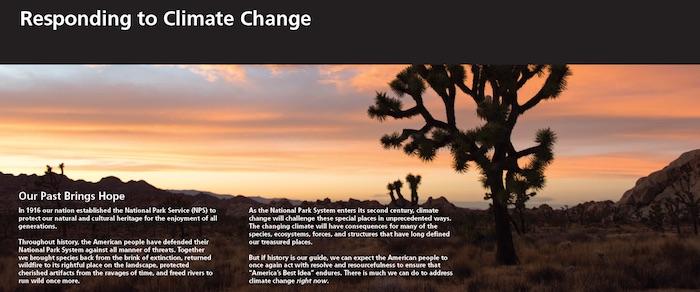
Is the National Park Service an outlier in the Trump administration when it comes to climate change?
That question arises not only when you look at the president's efforts to halt President Obama's work on climate change, but also in light of news that the U.S. Department of Energy's website recently was sanitized of climate change materials adopted by the Obama administration. Meanwhile, the Park Service just rolled out a four-color brochure on climate change impacts around the country.
Gone from DOE's site are a video about the 2016 Paris climate agreement, the link to climate.data.gov, another link to the National Oceanic and Atmospheric Adminstration's National Climate Data Center, and one to the National Climate Assessment. The changes were reported last week by E&E News.
The site does have a link to the president's Climate Action Plan, but it leads to a page with the message, "Thank you for your interest in this subject. Stay tuned as we continue to update whitehouse.gov"
Interestingly, that page does offer a link to the Obama Archive, which takes you to another page listing President Obama's work on health care, climate and energy, American leadership, economic progress, and equality and social progress.
As for the Park Service, the agency just released a brochure that discusses the many challenges the National Park System is facing due to climate change. It touches on melting glaciers, rising seas, altered ecosystems, and species endangered by climate change. Too, it mentions cultural aspects of the National Park System, such as Civil War-era Fort Jefferson at Dry Tortugas National Park, that are threatened by the changes.
Fort Jefferson sits at the water’s edge at Dry Tortugas National Park. Sea level has risen steadily since completion of the fort in 1875, threatening several islands of the Dry Tortugas.
The Park Service also took time to include information on the human causes of climate change and how they can be mitigated.
Using historical climate data, scientists create climate models to project potential future climate changes. Continued GHG emissions will cause further warming and long-lasting changes, increasing the likelihood of irreversible impacts.
However, limiting climate change is not beyond our control. Substantial and sustained reductions in GHG emissions now, along with efforts to adapt to change that is inevitable or already happening, can limit climate change impacts.
The NPS recognizes that human activities—especially fossil fuel use and transportation—are changing the Earth’s climate. Together with our communities, we are taking action to reduce our own GHG emissions and model climate-friendly behaviors through sustainable operations and adaptation efforts.




Comments
You have quite the imagination Lee, or are terribly confused. Never said what you claim. All I have said is that one should not dismiss information based solely on the source, especially when the source is an aggregator. Instead, one should review the facts and opinions themselves to determine their veracity. And that statement applies no matter which side of the (any) issue you reside.
OK, gys, lets move on. Your bickering to each other is not furthering the discussion.
For those who many be interested npshistory.com has collected as much information on climate change as possible and place it on the web at the following site.
http://npshistory.com/natural_resources.htm#air
Good.
Get all the scientific documentation you can and put it somewhere the history revisionists can't reach.
Of course, science generally has a liberal bias.
https://www.scientificamerican.com/article/we-just-breached-the-410-ppm-...